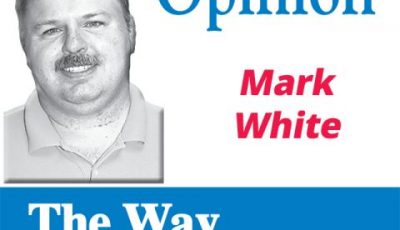HB 351 is bad public policy; urge Stivers to vote no
Imagine for a moment that you have an ethically-challenged local judge-executive, who is stealing money from their office, not that this kind of thing would ever happen in real life in the Commonwealth of Kentucky…LOL.

Mark White is Editor of The News Journal.
Now imagine that the Kentucky Auditor of Public Accounts – while doing a routine annual audit – discovers $100,000 in unaccounted for money missing from such an office, and issues a scathing audit with a recommendation that the FBI or Kentucky State Police investigate the matter.
Now imagine that our ethically-challenged office holder has the option of either having this audit published in its entirety in the local newspaper, which has thousands of readers, or this office holder has the option of instead publishing this report on the county’s official website, which on a good day gets maybe 100 or so views?
Which option do you think our ethically-challenged office holder is going to pick?
Let’s go out on a limb here and guess that our office holder picks their own seldom viewed website where they can control where the scathing audit about their office will be listed.
Anybody think that such an audit will be very easy to find on the website of such an ethically-challenged elected official?
Anybody want to make any bets about how long it would take for the link to such a scathing audit to go bad on the website of an ethically-challenged elected official, who has stolen $100,000 in taxpayer money? Anybody want to hold their breath until the link to such an audit gets fixed on the website of our ethically-challenged elected official?
No? I didn’t think so.
This isn’t the intention, but it is the reality of what legislation, which is currently being proposed by the Kentucky General Assembly in the form of HB 351, would allow ethically-challenged officials and others to do?
The stated purpose of this legislation is an effort by Frankfort politicians to try and save state and local governments the relatively few dollars – in comparison with their whole budget – that they are required to spend on legal advertising in local newspapers.
Legal advertising listed in newspapers provides a level of public transparency for local governments. This is something that many wouldn’t do on their own – particularly some of the more ethically challenged ones – unless they are forced to do so.
Think local corruption doesn’t still exist? The FBI just arrested two constables in Pulaski County Friday, who were indicted by a federal grand jury.
In addition to running legal ads in the newspaper here at the News Journal, where we have 18,000 – 20,000 readers each week, we also place the list of legal advertising on our website each week for all to see. Unlike some material, legal advertising isn’t placed behind our paywall.
Do I have a problem with fiscal courts and so forth running legal advertising on their own websites too? Absolutely not.
Some already do so, such as the Whitley County Fiscal Court, which lists copies of audits, budgets and financial statements on its website among other things.
To the credit of Whitley County Judge-Executive Pat White Jr. and local magistrates, the Whitley County Fiscal Court is already one of the most transparent local governments in the state.
The same can’t be said for everyone.
For those, who don’t think my $100,000 in missing money scenario is very realistic, try this one on for size.
The local judge-executive has a fishing buddy with a company that is struggling financially. The fiscal court has an upcoming project that they are going to take bids for to install a drainage tile under a road.
The local judge-executive makes sure his fishing buddy knows all the details for the bid proposal. The fiscal court is supposed to advertise on its website for two weeks that it is seeking bids for this project.
The notice goes up on the website for a couple of hours, then a problem suddenly “develops” with a link to the advertisement so other companies don’t know that they can bid.
The problem persists for several days and miraculously gets fixed a few hours before the bid deadline, but not in time for other companies to submit a bid.
Because other companies didn’t know about the bid since the link was down, no one else bids on the project besides the judge-executive’s fishing buddy.
Since the fishing buddy knew there wasn’t likely to be much, if any competition, he raises the price on his bid by $5,000 more than what he would ordinarily have bid in a competitive situation.
Now taxpayers are paying $5,000 more for the work than they should have, and companies, who are playing by the rules, are cut out of a chance to bid on the project.
HB 351 has already been approved by the house, and has now gone to the senate.
I would encourage News Journal readers to contact your local senator, Senate President Robert Stivers, either by e-mail at Robert.Stivers@lrc.ky.gov, or leave a message for him on the legislative message line at 1-800-372-7181, and urge him to vote no on this bill.





